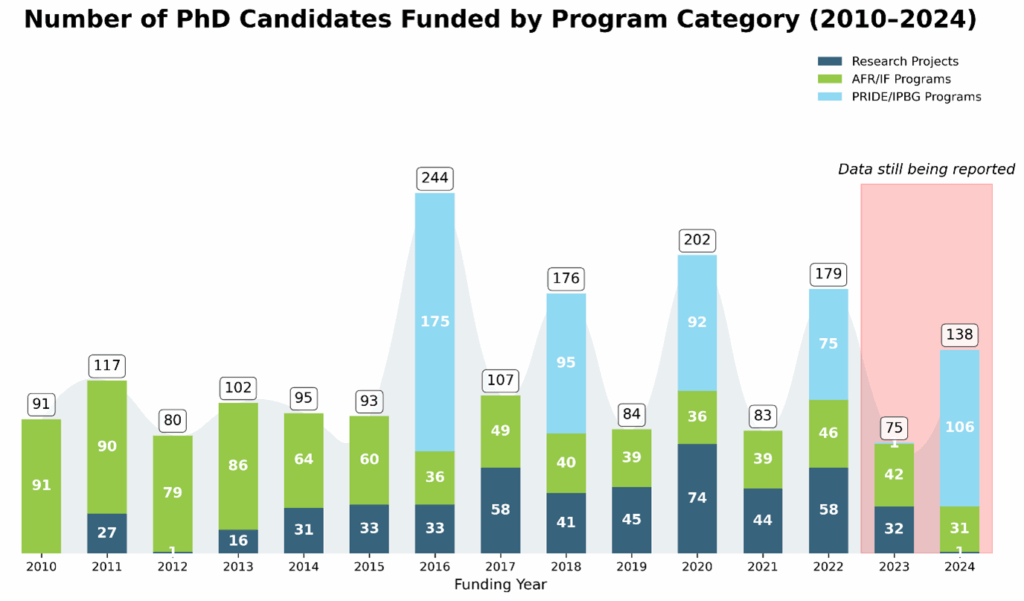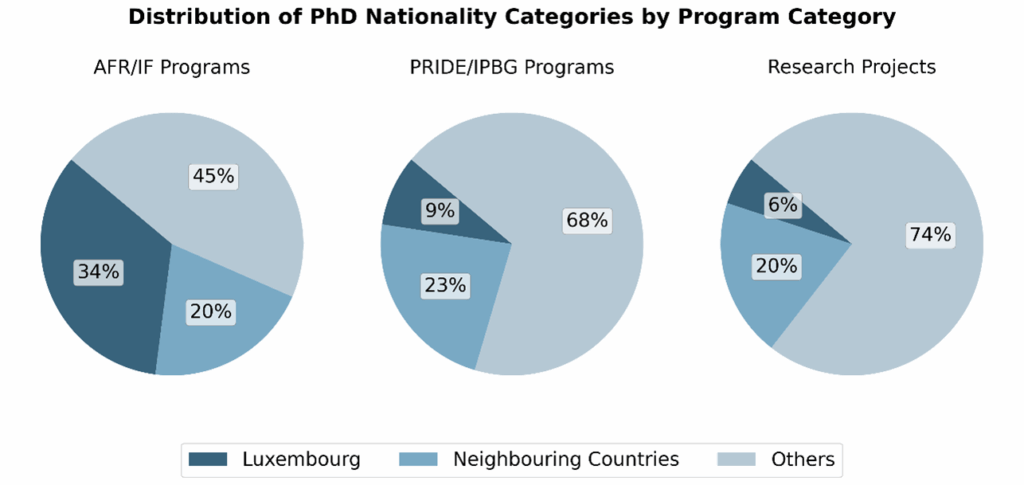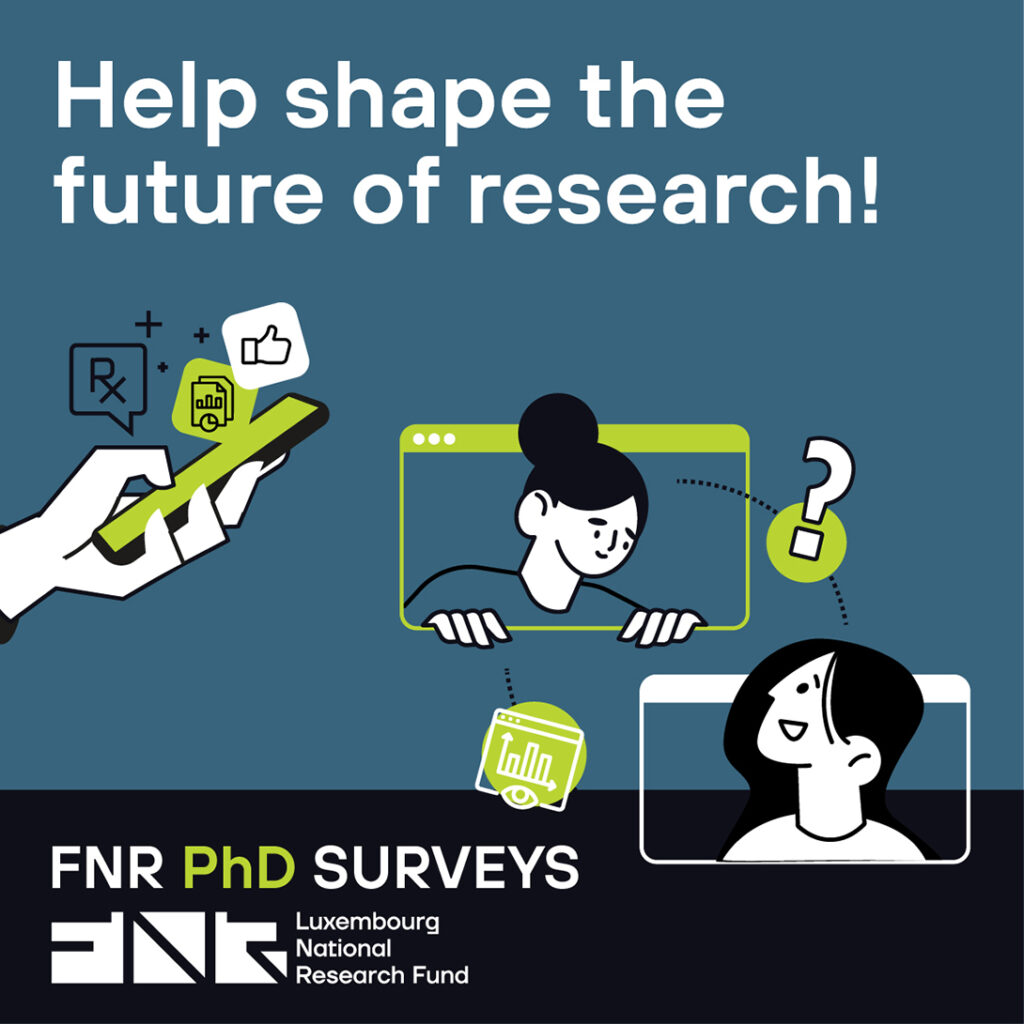BACK TO RESEARCH WITH IMPACT: FNR HIGHLIGHTS
In June this year, the University of Luxembourg welcomed a new generation of doctoral candidates at the 2025 Induction Days. It was a celebration not only of scientific potential, but also of the broader research ecosystem that supports Luxembourg’s early-career researchers. While several actors contribute to PhD funding in the country, including the University of Luxembourg, the public research institutions of the 3LIU (LIH, LIST, and LISER), and other research-performing institutions, this datafact focuses specifically on PhD candidates funded by the FNR.
Since 2008, over 2,200 PhD candidates have received FNR funding, with around 41% being women, 15% holding Luxembourgish nationality, 21% originating from neighbouring countries (Benelux region, France, and Germany), and 62% coming from the wider international community, altogether representing 99 different nationalities. These figures illustrate the international character of Luxembourgish research landscape and how FNR’s funding instruments support both the development of local research talent and the internationalisation of the national research system.
Over the years, three main pathways have emerged for obtaining FNR support to pursue a doctorate:
AFR and Industrial Fellowships – Candidate-Driven Pathways
Launched in 2008, AFR has been one of FNR’s longest-running funding schemes. It is unique in that it puts the initiative in the hands of the candidate, who proposes a research project and identifies a host institution in Luxembourg or abroad (AFR Incoming and AFR Outgoing). This format encourages individual project ownership and autonomy early in the research career. Initially, AFR featured four calls per year, later reduced to two, and eventually streamlined to a single annual call. The scheme has also supported public-private research collaborations since its inception. Originally referred to as AFR PPP (Public-Private Partnership), and rebranded as Industrial Fellowships in 2016, this component enabled PhD candidates to conduct research jointly supervised by a public research institution and a private company.
PRIDE/IPBG – Structured Doctoral Training and Talent Attraction
With the launch of PRIDE in 2015, FNR introduced doctoral training units (DTUs)—multi-year, thematic training environments where PhD candidates are recruited into pre-defined research clusters. Its public-private counterpart, IPBG, extends this model to collaborative efforts involving industry. In both schemes, candidates apply for advertised positions where the project scope is largely pre-defined. These schemes allow for the creation of critical mass in strategically relevant areas and promote the development of doctoral training structures and cohort learning.
Research Projects – Embedded PhD Positions
FNR’s third funding route includes investigator-driven projects such as CORE, ATTRACT, PEARL, INTER, OPEN, NCER and BRIDGES. These projects frequently offer PhD positions as part of larger research initiatives. The PhD candidate typically joins an established research group and works on a well-defined work package within the broader project framework.
To illustrate how each of these pathways contributes to the overall doctoral landscape, the charts below show the annual distribution of FNR-funded PhD candidates by programme category1 since 2010, as well as the distribution of PhD nationality categories by programme.

While the distribution has evolved over time, the most recent complete period (2020–2021) 2 shows a balanced pattern for the Luxembourgish Research Landscape: 26% of PhD candidates entered through AFR/IF fellowships, 32% through PRIDE/IPBG doctoral training units, and 41% through embedded positions in research projects.
When considering the natinoality groups, we see that AFR/IF has the largest cohort of national PhD candidates. The peculiarity of the AFR scheme is that it entails two sub-categories: AFR Incoming, open to candidates of any nationality for PhDs in Luxembourg, and AFR Outgoing, reserved for Luxembourg nationals or long-term residents pursuing a PhD abroad. This structure contributes to the fact that AFR/IF grantees are more often from Luxembourg or neighbouring countries.

In contrast, PRIDE/IPBG and embedded PhD positions in research projects are institutionally led, promoted via open calls, and tend to attract a more international pool of candidates. As a result, we observe not only different project initiation models but also distinct nationality patterns across schemes, with PRIDE/IPBG and project-based PhDs showing a predominantly international candidate profile.
To understand what other differences may occur between these programs, ongoing work is now examining how the structure of FNR’s doctoral funding, whether through candidate-driven fellowships, structured doctoral training units, or PhD positions embedded in larger research projects, shapes the learning experiences of PhD candidates and influences the visibility or originality of their scientific contributions. By linking this research back to FNR’s own programme architecture, the aim is to generate actionable insights to help guide the future design of our funding instruments and to ensure they support diverse and impactful doctoral journeys.
In parallel, FNR is also contributing to a broader understanding of doctoral careers. A recent study by Lawson and Lopes-Bento (2024) using FNR data examined the career satisfaction of PhD graduates—regardless of the programme through which they were funded. The findings show that PhD holders report high levels of job satisfaction even when working outside academia, particularly when their roles remain connected to research. This reinforces the idea that a PhD offers value across employment sectors, not just within academic settings.
To keep enhancing our understanding of early-career development, FNR has additionally launched a longitudinal survey in April 2025 to complement its analytical work. By combining these two approaches, quantitative analysis of research outputs and qualitative insight into doctoral pathways, we hope to generate a more complete picture of how our programmes support knowledge creation, professional development, and long-term impact, whether inside or outside of academia. These insights will help us to critically reflect on our policies and programs and to ensure that our doctoral funding instruments continue to evolve in line with the needs of the research community.
Specifications
1The number of PhD candidates is based on FNR internal records and is likely to be slightly underestimated. This is primarily because information on PhD candidates funded through research projects has only been systematically collected since 2011. In addition, for ongoing projects, details about associated PhD candidates are not yet available, as there is typically a two-year delay between the start of a project and the submission of the PhD candidate report that confirms doctoral involvement. For latest PRIDE and IPBG projects, only the requested number of PhD positions is currently reported, which may not always reflect the actual number of PhD candidates ultimately funded.
2The period 2020–2021 was chosen to allow for a consistent and representative comparison across pathways. PRIDE and IPBG calls take place biennially, while AFR and research projects are awarded annually. Using a two-year period ensures comparable proportions across programme types. By “complete,” we refer to the availability of PhD candidate reports, which are submitted approximately two years after project start.

What we’re exploring:
- Your aspirations, motivations, and challenges as an early-career researcher
- Your career path after completing your PhD
- How public investments are driving scientific progress, and shaping researcher careers.
Simply share your (private) email and PhD start date below in order to participate.
Related highlights
Three years of Narrative CVs at the FNR: what the data tell us
Feedback from applicants and reviewers (2021–2023) and what we’re researching next Since 2021, the FNR has used narrative CVs as…
Read more
How Early Funding Decisions Shape Research Careers
Since its creation, the FNR has been committed not only to funding excellent research, but also to understanding how funding…
Read more
Rising Competition in CORE: A decade of increasing demand, improved proposals and tougher choices
As the 10th April deadline for the 2025 CORE call approaches, we take a moment to reflect on the evolving…
Read more
Spotlight on Young Researchers: How is scientific quality fostered by research collaboration?
In the last decades, how research is conducted has been profoundly changed by ICT, and there has also been a…
Read more
The Science of Science: understanding what makes [excellent] science
The digital transition of society over the last decades has brought with it a wealth of data about research –…
Read more